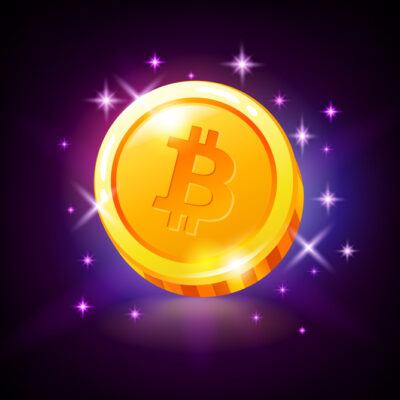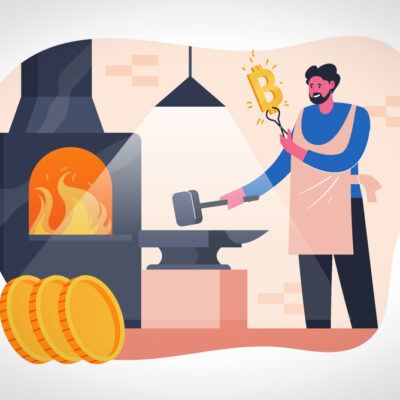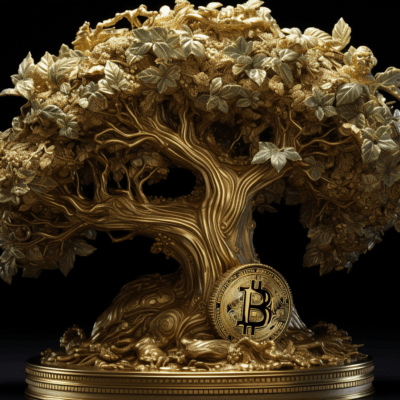
The conversation around why bitcoin has value, or whether or not it even has any value at all often leads to a discussion about gold. Bitcoin is like digital gold, right? So what about bitcoin vs gold – which one is better?
It’s undeniable that gold has value, but did you ever ask yourself why gold has value? Humans didn’t just wake up from their primordial soup and start digging in the ground for gold to build a global economy. Gold became money over time, through trial and error, and was the winner of a millennia-long competition between competing moneys.
Gold isn’t “backed” by anything. Gold is money. Anything can become money if it has the qualities of money.
Properties of Money
- Durable
- Portable
- Divisible
- Verifiable/Recognizable
- Fungible
- Scarce
Gold contained these properties and performs their attributes better than other types of competing moneys. For example, gold is more divisible than cattle. It’s more durable than copper. It’s scarcer than silver.
Bitcoin also contains the properties of money, and in many ways, performs these attributes even better than gold. In this article I want to compare bitcoin vs gold, and how well each one exhibits the six properties of money.
Bitcoin VS Gold: The 6 Properties Of Money
1. Durability

Durability is one of the most important monetary attributes because it allows us to transfer value across time. Money must be durable in two ways, in that it will not degrade in quality or in value. This means that the money itself will not be destroyed, but also that it will hold its value over time.
For example, salt was sometimes used as a payment mechanism in the past. Salt is physically hard, so it lasts over time, and at that time, it had to be mined with physical labor then transported across long distances, so the supply could not be inflated at will. Sounds like a pretty good money, right? Unfortunately, if salt gets wet, it can be destroyed, and it can be contaminated if left uncovered. Also, as salt mining techniques improved over time, it became easier and easier to acquire, to the point now where it’s free in any restaurant and costs a few dollars at the store.
Salt was durable but not as durable as precious metals like copper, silver, and gold!
Even looking at the range of precious metals, you can see how gold is superior in terms of durability. Copper corrodes quite easily, and even silver corrodes over time, given certain conditions. Gold doesn’t corrode, tarnish, or oxidize. It’s also much harder to find in the Earth’s crust, so it’s harder to mine and refine more of it.
Because of gold’s excellent durability, it’s able to hold its value over time better than any other commodity we know. So how does bitcoin compare in terms of durability?
Bitcoin VS Gold Physical Durability
Bitcoin is digital, so it simply cannot corrode or tarnish or be destroyed by anyone other than the holder (more on this below). Bitcoin is information. Bitcoin isn’t “stored” on devices, so it cannot be even corrupted or destroyed like other types of data. There is no such thing as a “damaged bitcoin”.
Even in the world of gold, a well-preserved gold coin will be worth more than one that is bent, scratched, or otherwise damaged by time. In this way, bitcoin has superior durability than gold.
In terms of physical theft, bitcoin is, again, superior to gold. If properly custodied, the chances of losing your bitcoin to theft are zero. Bitcoin cannot be hacked. Bitcoin cannot be stolen without you willingly (even if tricked) sending it to someone. It’s even possible to create decoy wallets with small amounts of bitcoin to trick any physical attackers.
Gold, however, can be stolen covertly or through brute force. Someone could sneak into your house at night and take your gold. Someone could beat you over the head until you give up your gold location or the safe password. With Bitcoin, you could give them a decoy 1 BTC, and nobody would know about your secret wallet with your main stack of 10 BTC.
Bitcoin VS Gold Time Durability
Bitcoin can be “burned”, meaning lost forever and irrecoverable. If you send bitcoin to a non-bitcoin address, or in some cases, if you send bitcoin to an improperly formatted bitcoin address, it could be gone forever. You can even burn bitcoin on purpose, sending it to an address in exchange for an alternate token that requires that you burn bitcoin to receive the token.
Another way bitcoin can be lost over time is simply by losing your private keys. Private keys are never revealed to any central entity, and you are the sole person who has access to your funds. There is no bank. There is no customer support. There are no do-overs. If you lose your keys, your bitcoin is lost forever. There are ways to do “collaborate custody” to get around the challenge, but even so, loss of keys is one of the most common ways to screw yourself out of bitcoin.
Gold, in contrast, is almost impossible to make unusable. Without intentionally turning it into a liquid using a mix of hydrochloric acid and nitric acid, then pouring the liquid down the sink, the gold will exist forever. If you lose it, someone else can find it. If you forget where it is, you might run across it later. Even if you give it to the wrong person, they can still spend it.
A good way to visualize this is to imagine you leave some bitcoin and some gold in a safe for your grandchildren to inherit. They discover the safe after your death and open it. If your private key was written on paper and the pencil faded, they would not be able to recover the bitcoin. The gold, however, would be fine. Of course, if you’re aware of this issue, you could mitigate it by etching your key into steel, or using a multisig scheme as part of a trust, but the example is clear.
So, in this way, gold could be considered more durable against accidents over time. The chances of losing your bitcoin due to carelessness or mistakes is greater than gold in my opinion. Gold is more accident proof.
Bitcoin VS Gold Supply Durability
One more thing to consider in terms of durability over time, and how gold may compare to bitcoin is that there is a MASSIVE amount of gold still left in the Earth that has not been mined yet. When you consider the universe? Near infinite.
Compare that with bitcoin, of which there will only ever be 21 million units. It’s practically impossible to make more. I say “practically”, because technically, it’s possible, but it would require a global, near unanimous decision by current bitcoin holders to dilute the value of their property and compromise the bitcoin narrative. It’s just not going to happen. That’s why I’d typically say that it’s impossible to make more bitcoin.
It is possible, however, to dig up more gold. In fact, as the price of gold rises, it becomes increasingly feasible to extract more gold from the Earth. The only thing stopping people from mining more right now is the price they can sell it at.
If the price of gold 10x’d tomorrow, there would be a hundred new gold miner startups and old miners would start purchasing more equipment. There would be tons more R&D into how to get more gold out of current mines, and efforts to find new deposits. The gold is out there, people just need an incentive to get it.
If Bitcoin 10x’d tomorrow, it would be impossible to mine more bitcoin at a faster pace. No matter how many ASICs you plug in, you just can’t do it. For this reason, I would consider the supply of Bitcoin more durable (predictable) than gold.
Related Content
2. Portability

Gold survived as a money for many years because it was portable across both time and space. Portability across time was covered above in the durability section. Gold doesn’t corrode or decay over time. Portability across space could also be related to durability, since gold is a very hard substance, and can literally be put into your pocket or loaded into a wagon, and it can survive to pass on to the next person.
In terms of having superior portability compared to other types of money, gold is often contrasted to real estate. While real estate has been a store of value for many millennia, it’s impossible to move. You can buy a beachfront property, but you can’t take that property with you. You can’t put the beach sand in your pocket and you can’t load up the ocean view into a wagon. Aside from the impracticality of actually moving something as large as a house, which is most likely built right into the ground itself, property often has value precisely because of its location.
It doesn’t matter where you hold gold though. Its value doesn’t change based on location. A gold coin on the coast is worth as much as a gold coin in a high altitude logging village.
Gold Is Heavy. Bitcoin Is Digital
However, gold is heavy, and moving it lots of gold requires lots of energy. In the past, that was wagons and horses. Then it was steam engines. Now it’s massive ocean vessels and airplanes. It’s expensive to move gold across large distances.
It’s also dangerous. Moving gold puts you at risk of adverse weather events and complete loss of your money (shipwrecks & plane crashes), or theft.
Bitcoin is digital, so is very much superior to gold in this regard. You can send bitcoin to anyone, in any amount, as long as they have internet or data connection via cell phone, and sometimes, even without internet access. Rather than requiring thousands of dollars and months of time to do a final settlement of gold transaction, you could transfer the same value using bitcoin in a few hours, for a few dollars.
One disadvantage to Bitcoin in terms of portability is that it costs money to do a transaction. With gold, I just hand you a gold coin, and the transaction is free. With bitcoin, it costs a fee to get my transaction added to the network. There are ways to optimize this so you can pay cheap fees, and with 2nd layers like lightning, the cost becomes near free, but network fees are definitely something you should be aware of.
I think you could make the case that this fee is well worth it, because of the security benefits the miners provide. With gold, a 3rd party could simply steal the coin during the transaction, while with bitcoin, that wouldn’t be possible.
Bitcoin VS Gold Security

Security when transporting and storing bitcoin vs gold is also interesting to consider. In terms of transportation, I think that bitcoin is the clear winner here. I can transport billions of dollars worth of value in my pocket, or even stored in my mind. If you can memorize 12 words, then you can memorize the keys to unlock your bitcoin. This is a huge advantage to moving value across borders, especially in emergency situations.
There’s a famous story about Jews in Germany who had to convert all their savings into platinum, then fashion them into coat hangers, in order to secretly move money across the border during WWII. There are countless other stories of people fleeing oppressive regimes and leaving their entire savings behind, even in the modern era.
Aside from the unlikely event that you have to leave everything behind and start a new life in a foreign country, imagine trying to move your life savings in gold while just moving house! Even moving across town, you’d either need to hire an ultra-secure, well-known, and trusted gold-transport service, or put yourself at some serious security risk.
Just have a few gold coins as your savings? What if there’s a hole in your pocket, or you take out your phone and they drop out? Even if you take special care, what if you have a car accident on the way or get pulled over by the cops and they confiscate your money (civil asset forfeiture)?
You Can Memorize Your Bitcoin
You don’t have the same problems with bitcoin. Even in the case that you are transporting your single-sig seed phrase, you at least have the option of more hiding places since it’s a piece of paper. If you are concerned about losing the paper, you could keep the paper, but memorize a single passphrase and create a secret wallet, so your main wallet has zero funds. You could also send the funds to a multisig scheme with a collaborative custodian, using your phone as one key of the 2-of-3 signature scheme. This way, even if someone tries to confiscate 1 of 3 of your bitcoin wallets, you can still recover the bitcoin.
There are lots of options. Bitcoin isn’t physical, so it’s obviously easier to transport securely.
When it comes to storage security, however, I see that there are pros and cons to the bitcoin VS gold debate.
As mentioned above, bitcoin has more security options, so in many ways I prefer bitcoin. You can design a multisig scheme. You can create a Shamir secret backup. You can do something called SeedXOR to create decoy seeds. You can divide your bitcoin into multiple wallets. You can put your bitcoin into a secret wallet by creating a passphrase. The only limitation to security options for storing bitcoin is your technical ability.
Bitcoin Can Be Scammed (Not Hacked) Remotely
However, there is still the kink that you can be tricked or scammed remotely.
With gold, assuming that you self-custody, stealing it requires that someone goes to your house, knows where you hide it, breaks in, and gets away with the crime. There is a lot of risk to the attacker. With bitcoin, they can send you thousands of spam emails a day, or one tricky text, or phish you on Tinder with a photo they downloaded from the internet. It’s relatively cheap and fast to attempt to steal bitcoin.
Even though you have many more security options in Bitcoin Land, the possibility of shooting yourself in the foot is much greater since the attacker doesn’t have to be in the same physical location as your bitcoin.
Bitcoin can’t be hacked, but there are plenty of ways an attacker could trick you into sending them bitcoin. Phishing attacks via email or malware via browser extensions are quite common, so you need to be somewhat familiar with basic computer security.
Even so, gold storage has some disadvantages too. You still need a physical safe to store it properly, and most safes are not actually theft-proof. They are designed to prevent kids from getting into stuff, but any moderately capable thief could crack them open with a crowbar.
Oh, and if you store your gold at the bank? Good luck getting it in an emergency. They’re only open weekdays from 10-4.
3. Divisibility

In terms of divisibility, Bitcoin easily wins. The divisibility of gold has been a known issue for hundreds of years, which is why silver was often used for small transactions. The logic was very simple. Gold was more valuable than silver, but silver was still pretty valuable, so gold would be the high value coin, and silver would be the low value coin.
Physically speaking, gold can be divided into single atoms, but it’s impossible to hand someone a few gold atoms for a cup of coffee. Even trading in gold dust is quite hard, and makes it near impossible to verify that what you actually have is real gold without access to a chemistry lab.
Later on, paper claims on gold made it easier to trade smaller amounts of gold, but those were claims on gold, not the gold itself.
Bitcoin is divisible down to the hundred millionth of a unit called satoshis. “A whole Bitcoin” is just a collection of 100,000,000 satoshis. You can send 100 sats just as easily as 100 bitcoin.
You Can Buy A Fraction Of A Bitcoin
Divisibility is one of the more misunderstood aspects of bitcoin for newbies. People look at the price of a whole bitcoin sitting around $40,000 USD and they think, “I could never afford a bitcoin!” What they don’t realize is that you can buy a fraction of a bitcoin. You don’t have to buy a London Good Delivery gold bullion bar ($600,000+) to own gold. You can buy as small as a 0.1 oz gold coin ($250+), and the function of gold works the same. It’s just worth less because it’s a smaller unit.
Unfortunately, unit bias means people would rather own a bag of silver coins instead of a single gold coin because you get “more for less”. Similarly, in the digital realm, many people gravitate towards altcoins because they appear “cheaper”. Don’t fall into this trap.
At this time, you can still get over 2,000 satoshis for a single dollar. That means a single satoshi is worth fractions of a penny, while the smallest unit of gold coin that is widely available is worth more than $250.
Projecting out even further into the future, assuming that bitcoin reaches $100,000,000 (ONE HUNDRED MILLION DOLLARS) in value, and a satoshi is worth a dollar or more, could bitcoin still be divisible beyond that? Yes. It would require a hard fork, which would be difficult to achieve at that point, but there could be smaller subunits added to the bitcoin network. Currently, you can actually trade millisatoshis while using the lightning network, but these are not “official” units of value, and require trust in the bookkeeping of the lightning nodes you interact with.
Right now, it’s not an issue, and we still have lots of room to run. Honestly, if bitcoin is worth $100mil, I think our units of value will have shifted around enough that maybe nothing will cost less than a few satoshis anyway.
4. Verifiability/Recognizability

Have you ever seen someone bite a gold coin in the movies to verify that it’s real? Gold is a relatively soft metal, so if you bite into a 100% gold coin hard enough, you’ll make some teeth prints into it. Biting gold coins was a low-tech way to verify gold’s authenticity.
Visually, it’s pretty easy to identify gold as well, at least to distinguish it from obvious fakes. I remember seeing real gold for the first time when shopping for wedding rings. I honestly had never owned anything gold in my life. It was an absolutely unique feel, and I was surprised by the weight of it.
The trouble with verifying gold is that it can be filled with non-gold substances to varying degrees. Gold plated things could perhaps be scratched or etched to discover fakes, but high volume gold fakery is worth the time to create, and there are many instances of gold bars being filled with tungsten. Even legit gold custodians can be scammed themselves and be unaware that they are selling fakes.
To truly verify the authenticity of gold bars and coins, you need to fully melt down the unit and re-mint it. Even with a purity tester ($2,000+), you’re only testing the authenticity of the gold. If your unit is gold plated or chelated with small amounts of other metals on the inside, you wouldn’t be able to test that without melting it down.
Perhaps with some expensive x-ray machinery you could get some middle-ground verification, but that will cost thousands of dollars and let’s be honest, are you really going to invest that money, or are you just going to trust the exchange you bought from?
Bitcoin Is Cheap And Easy To Verify
Bitcoin, however, is very cheap and easy to verify.
On the surface level, any wallet software you use is going to verify your bitcoin transaction for you. As long as you trust the wallet, you can be sure that the bitcoin you own is real bitcoin. It’s not like you can create a “fake bitcoin” and send it to a bitcoin wallet. The wallet will simply ignore the transaction. Using a trusted wallet like CashApp or Strike, you can be 100% sure that any bitcoin you receive is real bitcoin.
Going a step further, you can even verify that the bitcoin is real by running your own node. Every bitcoin wallet MUST use a node, so if you are using a wallet like CashApp or Strike, you are trusting their node. A node will track every single bitcoin transaction that ever occurred on the network (from the first block!) in order to make sure each bitcoin transaction that preceded it is legit. By using their node, you are assuming they are keeping proper track of bitcoin transactions, and that they are verifying everything correctly.
If you don’t trust them, no big deal. You can get a different wallet that allows you to use your own node, and then you will personally verify all bitcoin transaction history back to 2009 so you can be sure that the bitcoin you just received is legit. It costs about $200 and a few hours of your time to buy the node hardware and set it up.
5. Fungibility

Fungibility of bitcoin vs gold is an interesting contrast because this is not a word that most people know, and it’s not a concept that most people have thought about much. To be honest, I was new to it as well when I first learned about bitcoin.
Fungibility is the idea that each unit of money is equally valuable to another unit of money. For example, if I have five separate $1 bills and want to buy something from the store, they would equally accept those bills versus someone else’s bills. It doesn’t matter who gave them to me. When the store makes change for the next customer, that person equally doesn’t care where those bills came from, because they know the next person down the line will also accept them.
It’s a common urban legend that all $100 bills in the USA contain trace amounts of cocaine because they are used to snort coke. Whether this is true or not, it explains the principle of fungibility well. I can pay for my kids’ daycare using a $100 bill that used to be owned by a coke dealer. Totally fine.
Gold is very fungible, but has some issues.
Gold is a metal, and any amount of pure gold is worth the same as any other equal amount of gold. It doesn’t matter if the gold is from Asia or Africa, or if it’s made out of gold dust from a stream or melted down from gold embedded in rocks. Gold is gold.
Some Gold Coins Are Worth More Than Others
However, gold loses a bit of fungibility during the minting and exchange process. Some gold coins have different pictures and prints, and originate from different mints, and although they are the same weight, they sell for different prices. I just checked the APMEX website, and a single 1 oz American Eagle sells for $1,952, while a Canadian Maple Leaf is selling for $1,962. A 1 oz Maple Leaf with abrasions is selling for $1,937, but a 1 oz Gold Buffalo with abrasions sells for $1,982.
This is unfortunate because it means that if we were to truly use gold coins as a medium of exchange, there would be multiple exchange rates for each type of gold coin. As a matter of fact, there may even be different exchange rates based on the weight of the unit because of the practical aspect of exchanging gold. Gold coins are generally more expensive per unit of weight because they cost more to mint, while gold bars are cheaper because you are “buying in bulk”.
Bitcoin is more fungible than gold in some aspects, but less fungible in other ways.
Bitcoin Can Be “Tainted” By Previous Holders
Continuing the example from above, no unit of bitcoin is worth more than any other equal unit. There are no printed faces on bitcoin, and it doesn’t take more energy to send ₿0.01 versus ₿10.01. It’s not easier to store or transact higher volumes of bitcoin either. For a short period virgin coins (freshly minted bitcoin) carried a premium, but interest in it died out due the complexities of the “purity test” for these coins.
However, bitcoin is a public ledger, and you can trace every single transaction back to the beginning of the first transaction to Hal Finney in 2009. Using blockchain analytics, some users and companies can identify certain transactions with specific people or activities. For example, the coins hacked in the Mt. Gox hack are forever traceable back to that event. Coins used in Silk Road transactions will forever be associated with that and cannot be “unlinked” from those previous activities.
Right now, this doesn’t seem to be an issue, but it could be an issue in the future if bitcoin usage becomes more widespread. Could governments step in and force large exchanges and wallets to blacklist certain bitcoin addresses? It’s possible. But then again, the US government auctioned off 29,000 bitcoin it confiscated from the Silk Road, where people bought and traded bitcoin for all kinds of illegal stuff including drugs, prostitutes, and even alleged assassinations.
Isn’t that kind of an implicit acceptance by the largest and most powerful government in the world that past bitcoin history shouldn’t affect its fungibility in the future?
6. Scarcity

The scarcity debate is simple, but for some reason, people try to make it more complicated than it has to be. There is a hard cap limit on available bitcoin. There will only ever be 21 million bitcoin, and you can’t mine more bitcoin than is scheduled to be minted every 10 minutes. That will not change as long as you run your own node to verify the rules of the network. You can’t make more bitcoin, or invent a new bitcoin.
There’s More Gold Than You Think
With gold, while it’s true that there is a finite amount available in the sense that there is only one planet, not all of it has been extracted from the ground. There seems to be a lot more left to mine, and they are still discovering more..
The reason all that all the gold in the world hasn’t been mined yet is not because we don’t know where it is or how to get it. It’s because it’s more expensive to mine than the value you can pull out of the ground. It’s a matter of economics.
As the price of gold goes up, it’s worth spending more resources to extract gold that is more difficult to reach. It also becomes more valuable to do exploration and experiment with more advanced mining techniques. The supply of available gold is continually expanding, and we don’t know how fast or how long it will continue.
The supply of bitcoin is also continually expanding towards its 21 million limit, but it’s on a programmatic trajectory, and we know precisely how much bitcoin there is, how much will be released, when it will be released, and of course, how much there will ever be. Right now, there are 6.25 new bitcoin mined every 10 minutes, and there will only ever be 21 million total.
Some people get confused at this “limited amount” point and are concerned that if there is no expanding supply after some point, that people will just hoard bitcoin and the economy will grind to a halt. They think that nobody will use bitcoin because it will be too valuable, and that there’s not enough bitcoin to go around.
When they say something like that, it seems obvious to me that they don’t own any bitcoin, because everyone has a price. I own some bitcoin, and do not plan to sell it. However, if the price shot up to a million dollars, I’d probably sell some and just enjoy my life.
Bitcoiners Will Trade Around Bitcoin For Utility And Pleasure
The key here is that the utility of some other item exceeded the utility of holding bitcoin. Bitcoin is money, and money should be used for saving until you find a use or need for it. Just like dollars sit in your account until you want to deploy them, bitcoin sits in a wallet until you want to buy something with it.
As bitcoiners become wealthier, and more people demand to get paid in bitcoin, they will absolutely start to peel off some of their stack to pay for goods and services. The point of having money is to live life! Some bitcoiners may “never sell”, but many will. It’s just human nature. My dream is not to be dead and rich with my bitcoin wallet in my grave. I want to live a fulfilling life.
My point is that bitcoin will naturally trickle into the economy and exchange hands, just like every other type of money that ever existed.
Similarly, regarding the “limited supply” concern, I think it’s obvious that the economy will adjust itself. I find it hard to imagine that there will be a group of mega-quadrillionaire bitcoin owners, while the rest of the world begs in the streets for satoshis. People with money need services, and there are people without money who are willing to perform services – kind of how the economy works now.
Is Bitcoin Better Money Than Gold?

People understand gold as money because it’s shiny and hard to find. It’s simple to understand and use. Bitcoin requires that you think deeply and challenge some of your initial impression.
What is the nature of money?
Could something that doesn’t exist in the physical world actually be used to transfer value?
You have to learn what bitcoin is, learn how to use it, and believe in yourself enough to say, “I did my research, and I think Bitcoin is legit.”
For me? I’ve done the research. I believe in Bitcoin. I hold my own keys. I will never own any gold because of its drawbacks.
So, YES. Bitcoin is better money than gold. There is still a long way to go in terms of average people believing that Bitcoin has survived long enough for them to be able to trust that it’ll still be around in the future, but as it stands, Bitcoin certainly has a better chance of becoming a global monetary settlement network and medium of exchange than gold. Gold is done. It’s Bitcoin or nothing.
Bitcoin VS Gold Video Debates
There have been many long form debates on the topic of bitcoin vs gold. People in both camps are generally very intellectually rigorous and willing to put their opinions to the test in front of an audience.
After watching a few of these debates, I always walk away frustrated at the gold bugs making tired, hollow arguments about bitcoin being digital and having no “intrinsic value”, or gold being used as money for 5000 years so it will continue to do the same.
For gold bugs, it’s just very, very hard to get over the non-physical aspect of bitcoin. There are some gold bugs who also hold bitcoin, and they are much more interesting to listen to, but the guys featured in these bitcoin vs gold videos are usually the hardcore gold bugs with unwavering opinions.
Video: Gold vs. Bitcoin A Soho Forum Debate
Video: Bitcoin vs Gold: Michael Saylor and Frank Giustra
Frequently Asked Questions
Can Bitcoin Replace Gold?
Yes, bitcoin can replace gold as the prominent store of value used world wide. However, bitcoin cannot replace gold as it is used in industrial applications, and bitcoin cannot replace the role that gold has played in history as a store of value for civilizations across time and physical distance.
Is Bitcoin A Better Hedge Than Gold
Yes, for its entire existence, bitcoin is a better hedge than gold, assuming you held on long enough. However, it depends on what you’re hedging against. If your base case scenario investment strategy is apocalyptic meltdown and a return to pre-electricity civilization, then gold may be a better hedge for that. If you assume that technology will continue to improve and we’ll pretty much be OK for the next decades and centuries, then bitcoin will probably perform better.
Can I Buy Bitcoin With Gold?
It’s only possible to buy bitcoin with gold via peer-to-peer exchange, either in person, or through digital platform that involves escrow. It’s technically possible to build a platform that would allow the exchange of gold for bitcoin, but there doesn’t seem to be much demand for that type of service.
Can I Buy Gold With Bitcoin?
Yes, you can buy gold with bitcoin, and many gold bullion sellers accept bitcoin as payment. Some accept bitcoin directly, while others use an intermediary that allows you to pay in bitcoin, but have them receive fiat currency on the other end.
Will Gold Lose Value To Bitcoin?
It’s very likely that gold will lose value to bitcoin. Gold is a precious metal and cannot change under any circumstances, while bitcoin can be programmed and improved upon, especially if you consider current and second layer technologies that allow for even more programmability. Nobody can predict the future, and past performance is not indicative of future price, but if you buy into the bitcoin narrative and bitcoin continues to do as it has done for the past 13 years, then I would expect bitcoin’s user experience and uses case to improve over time, and I would expect gold to remain exactly as it is.


















 12 High Signal Bitcoin Substacks & Newsletters
12 High Signal Bitcoin Substacks & Newsletters
Leave a Reply